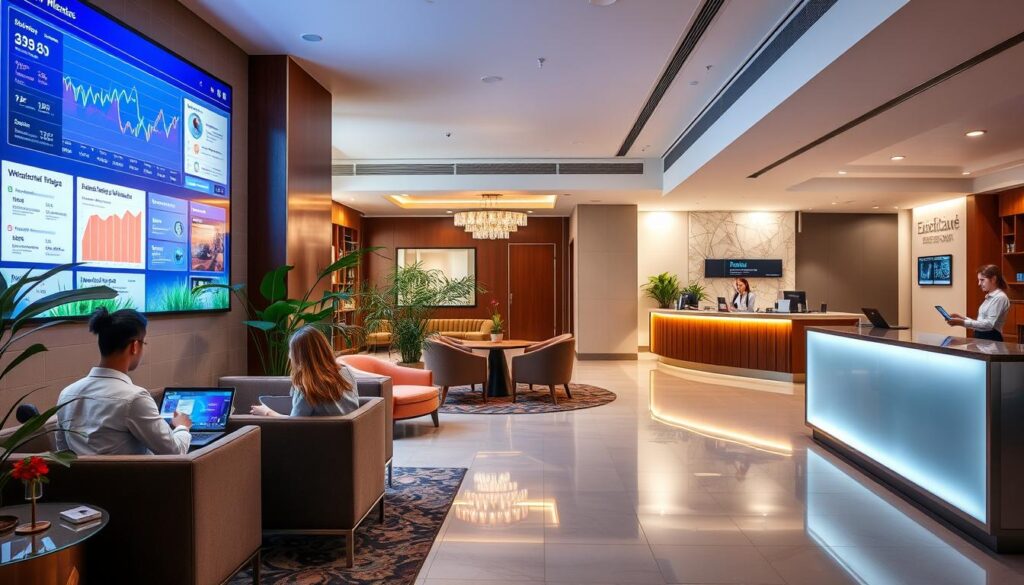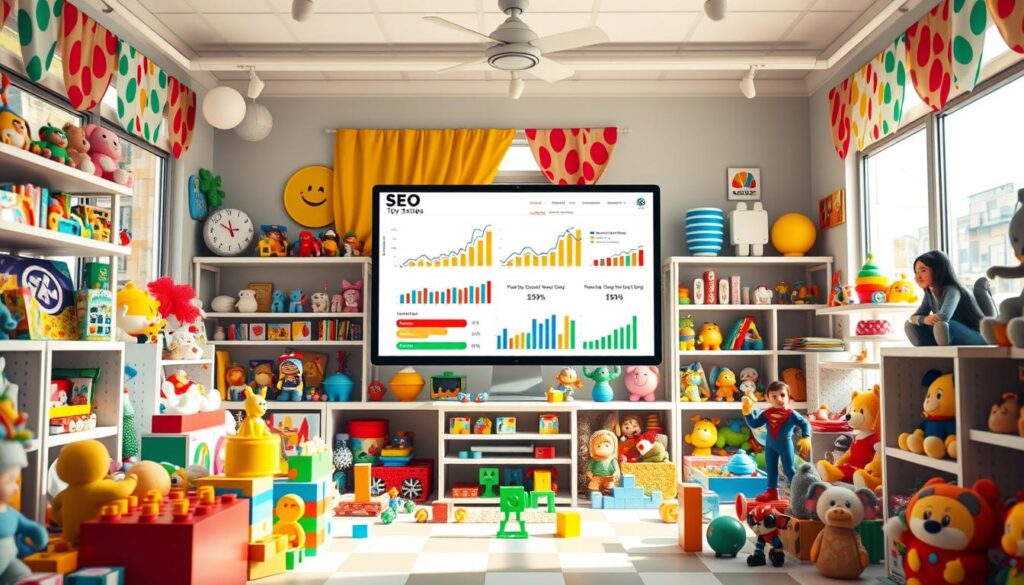Did you know over 90% of global online searches happen on Google? It’s surprising how some hotels and restaurants easily get to the top of search results. Others seem invisible. Understanding SEO in the hospitality world is key to attracting guests.
This guide will show you how to make your website more visible. It will help drive more traffic and increase direct bookings. In today’s digital world, knowing about hospitality digital marketing is not just helpful—it’s crucial.
Key Takeaways
- SEO is vital for visibility in the crowded hospitality sector.
- First-page search results receive over 90% of all web traffic.
- Content quality is a key driver of SEO success.
- Understanding user intent is increasingly important with evolving keyword strategies.
- Local SEO strengthens community engagement and foot traffic for hospitality businesses.
- Effective SEO strategies can significantly enhance direct bookings, reducing reliance on third-party services.
Understanding SEO in Hospitality Industry
SEO in the hospitality industry is key for hotels to shine online. It’s not just a trend but a must for better visibility. By using smart SEO, hotels can climb the ranks on search engines like Google. This helps bring more visitors to their sites.
Optimizing a hotel website involves many strategies. These include technical, on-page, and off-page tactics. 81% of travelers value user reviews, and 49% won’t book without them. So, SEO that boosts reviews and photos is crucial.
With more people booking hotels on mobile, hotels must focus on mobile SEO. 90% of digital travel content users in the U.S. use mobile. Core Web Vitals (CWV) help check website performance and user experience.
SEO in hospitality is all about creating engaging content for different travelers. 95% of users visit travel sites after booking. Optimizing Google Business Profile (GBP) can boost revenue and customer satisfaction.
A solid SEO plan boosts visibility and bookings. It also makes the user experience better. The hospitality world is always changing, so hotels need to stay flexible with their SEO. Learn more about SEO’s role in hotel websites.
What is SEO in Hospitality Industry?
SEO in the hospitality industry means using strategies to make hotel websites more visible online. It helps hotels rank higher in search results, making it easier for people to find them when planning trips. SEO for hotels includes things like finding the right keywords, creating good content, optimizing website tech, and getting more links.
Understanding what is SEO in hospitality industry? means seeing how important it is to be seen in search results. The top result on Google gets about 31.7% of clicks. On the other hand, the last result on the first page gets only 2.2% of clicks. This shows hotels need to work on their online presence.
Using the right keywords is key, especially for hotels in places like Male, Maldives, which gets about 1,000 searches a month. Using long-tail keywords helps hotels reach people who are really interested in booking. A good page title and meta description are also crucial for getting more clicks and better rankings.
Good SEO can help hotels make more money by getting more direct bookings. Creating educational content that inspires travelers can help hotels capture their interest early on. Working together, sales, marketing, reservations, and web teams can make a hotel’s online store better. Optimizing SEO for hotels is complex but can bring big benefits.

Importance of SEO for Hotels and Restaurants
For hotels and restaurants, a strong SEO plan is key to boosting their online presence. With more people searching for travel online, being seen is crucial. A good SEO strategy helps attract more guests.
Increased Visibility and Traffic
Good SEO makes hotels and restaurants more visible on search engines. Most travelers start their search online. Being at the top means more clicks and website visits.
Local SEO, like optimizing Google My Business, helps attract nearby visitors. It encourages them to check out what you offer.
Impact on Direct Bookings
SEO can also boost direct bookings for hotels. A solid SEO plan sends more people to your website. This means more bookings for you.
Online bookings are common, making up 58% of all bookings. By focusing on direct bookings, hotels save on fees. They also offer a smoother booking process for guests.
Enhancing Customer Trust and Credibility
Hotels and restaurants that focus on SEO build trust with customers. Positive reviews are key in making guests feel confident in their choice.
Creating helpful content, like FAQs and videos, showcases what you offer. It answers questions and provides important details. This transparency builds trust and shows you’re professional.
Crafting an Effective Hotel SEO Strategy
Creating a winning hotel SEO strategy is key to boosting online presence and attracting guests. The first step is to set clear objectives that match your business goals. Knowing what you want helps focus your efforts in hospitality digital marketing.
Setting Clear Objectives
Having well-defined goals is crucial for a successful hotel SEO strategy. These goals might include:
- Increasing direct bookings by a specific percentage
- Improving website traffic through organic search results
- Enhancing online visibility for local searches
Each goal should be measurable to track progress. With 70% of travelers booking hotels online, strong SEO can help reach them.
Identifying Target Audience
Knowing your target audience is the core of any marketing plan. Hotels need to understand who their guests are, what they like, and how they book. This info guides content and marketing, making sure you’re targeting the right keywords.
Creating content for specific groups, like families or business travelers, boosts engagement and bookings. Remember, nearly 60% of travelers check out several sites before booking. So, having a strong online presence is vital.

Keyword Research: The Foundation of SEO
Keyword research is key to good hospitality SEO. It helps hotels find the right words to reach their audience. Knowing the difference between long-tail and short-tail keywords is crucial for a winning strategy.
Long-Tail Keywords vs. Short-Tail Keywords
Long-tail keywords are detailed phrases that draw less competition but more targeted traffic. They show exactly what users want, leading to better results. On the other hand, short-tail keywords are broader and more competitive, making them tougher to rank for. For example:
- Long-tail example: “luxury beachfront hotels in Miami”
- Short-tail example: “hotels”
Tools for Effective Keyword Research
The right tools make keyword research better. Google Keyword Planner and SEMrush give insights into search volumes and competition. Other great tools include:
- Ubersuggest
- Ahrefs Keyword Explorer
- SEMrush Keyword Magic Tool
Analyzing Competitor Keywords
Looking at what competitors use helps hotels understand the market. By seeing which keywords work for others, hotels can find their own strengths. Keeping an eye on search rankings and competitors keeps hotels ahead in the digital world.

On-Page SEO Techniques for Hospitality Websites
Effective on-page SEO is key for making your hospitality website more visible and engaging. It involves optimizing your website’s elements to boost search rankings and attract users. This includes refining page titles, meta descriptions, and creating content that speaks to potential guests.
Optimizing Page Titles and Meta Descriptions
Page titles and meta descriptions are the first thing users see when searching online. They need to be unique, compelling, and include relevant keywords to increase click-through rates. For example, using keywords like “luxury hotel in Nashville” can draw in the right audience. Each page should have its own title and description that matches the content.
Creating High-Quality, Relevant Content
Content quality is essential in today’s SEO world. Creating content that is informative and relevant to travelers can make your hotel a trusted source. Consider writing blogs about local attractions or guides to dining experiences to boost your SEO.
Adding statistics, like how 81% of travelers value user reviews, can increase credibility and bookings. Providing a great user experience with high-quality images and fast loading speeds is crucial. A well-structured website not only attracts visitors but also keeps them coming back.
Technical SEO Considerations for Hotels and Restaurants
Technical SEO is key for hotel and restaurant websites. It makes websites work better and look good. It helps people find your place online.
Website Speed Optimization
How fast a website loads matters a lot. Hotels need their sites to be quick to keep visitors happy. Fast websites are better for search rankings.
Metrics like Largest Contentful Paint (LCP) show how fast a site loads. A score under 2.5 seconds is great. To speed up, optimize images and cut down code.
Mobile Responsiveness and UX
More people book hotels on their phones. So, websites need to work well on mobiles. Responsive design makes content look good on all devices.
First Input Delay (FID) shows how fast a site responds. A score below 100 milliseconds is good. This keeps guests happy while they search.
Canonical Tags and URL Structure
Canonical tags help search engines find the right page. They prevent duplicate content problems. Good URL structure helps search engines find your site.
Organized URLs make it easier for people to find what they need. This is important for good hospitality digital marketing.
| Metric | Good | Needs Improvement | Poor |
|---|---|---|---|
| First Input Delay (FID) | Under 100 ms | 100 ms to 300 ms | Over 300 ms |
| Cumulative Layout Shift (CLS) | Less than 0.1 | 0.1 to 0.25 | Greater than 0.25 |
By focusing on these technical areas, hotels and restaurants can improve their online presence. This makes their websites better for search engines and users.
Local SEO Strategies for the Hospitality Industry
Local SEO is key for hotels and restaurants to attract local customers. By using smart strategies, businesses can get more visibility, more people walking in, and more online bookings. A well-done Google My Business profile is crucial. It helps businesses show themselves well to potential guests.
Google My Business Optimization
It’s vital to optimize your Google My Business profile to rank higher in local searches. People looking for places to stay or eat want accurate and detailed info. About 88% of people check online reviews before choosing local services.
Keeping your hours and contact info up to date can really help. Also, adding great photos can make people more likely to visit your website. This can increase your visibility a lot.
Getting Featured in Local Listings and Reviews
Being in local listings and getting good reviews is a big part of a strong local SEO plan. Keeping your profile updated and adding quality content helps search engines see you as more credible. Tools like Semrush Local’s Listing Management make it easy to update listings on many sites at once.
Good reviews can make your hotel stand out. Search engines look at how many, how good, and how recent the reviews are. Getting feedback from guests is important. It helps with both individual choices and your overall ranking.
| Strategy | Benefits | Examples |
|---|---|---|
| Google My Business Optimization | Higher visibility in local searches, increased click-through rates, and enhanced customer trust | Regularly updating profile information and adding photos |
| Encouraging Reviews | Improved search rankings and customer engagement | Offering incentives for reviews and responding to feedback |
| Utilizing Local Listings | Boosted online presence and searchability | Listing on platforms like Yelp and TripAdvisor |
Measuring SEO Success in the Hospitality Sector
It’s key to know the metrics for SEO success in hotels and hospitality. By using specific KPIs, hotels can see how well their SEO is working. They can then make their strategies better over time.
Key Performance Indicators (KPIs)
KPIs give insights into SEO success. Important ones include:
- Organic Traffic: This shows how many visitors come from search engines, showing SEO success.
- Bounce Rates: A high bounce rate means visitors might not find what they’re looking for.
- Conversion Rates: This tracks how many visitors do what you want them to, showing strategy success.
- Keyword Rankings: Watching where a hotel ranks for keywords shows how well optimization works.
Using Tools to Track SEO Performance
Many tools help track these metrics, giving valuable data for SEO strategies. Here are some top ones:
| Tool | Function |
|---|---|
| Google Analytics | Tracks organic traffic, bounce rates, and conversions, offering detailed insights into user behavior. |
| SEMrush | Helps monitor keyword rankings and analyze competitor strategies, aiding in targeted SEO efforts. |
| Ahrefs | Provides comprehensive backlink analysis, crucial for improving organic search visibility. |
| Google Search Console | Offers insights into site performance and alerts about potential issues that may harm search visibility. |
Using these tools boosts SEO services for hotels. It also helps in making strategies better with real-time data. For more on improving SEO in hospitality, check out this comprehensive guide.
Conclusion
In the competitive world of hospitality, SEO is key. Hotels and restaurants need effective SEO to succeed. Local SEO is especially important for better rankings and more bookings.
Working with a hospitality SEO agency, like Revenue Boomers, can help. They offer strategies that meet the industry’s needs. By focusing on keywords, meta tags, and local listings, hotels can reach more people.
With more people booking on mobile, it’s crucial to keep up with trends. Regularly checking and updating your SEO efforts is vital. This ensures your business stays ahead in the digital world.






